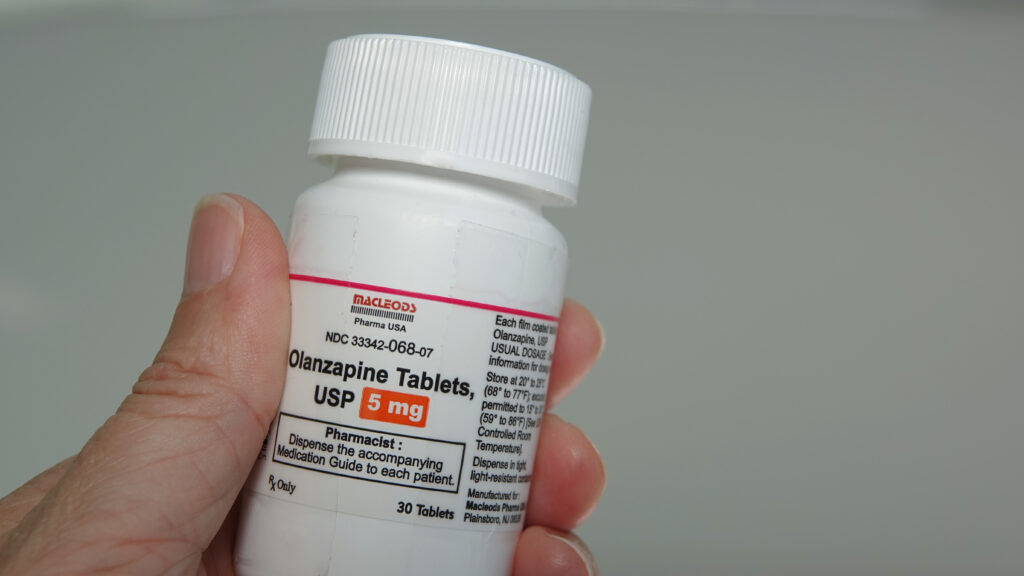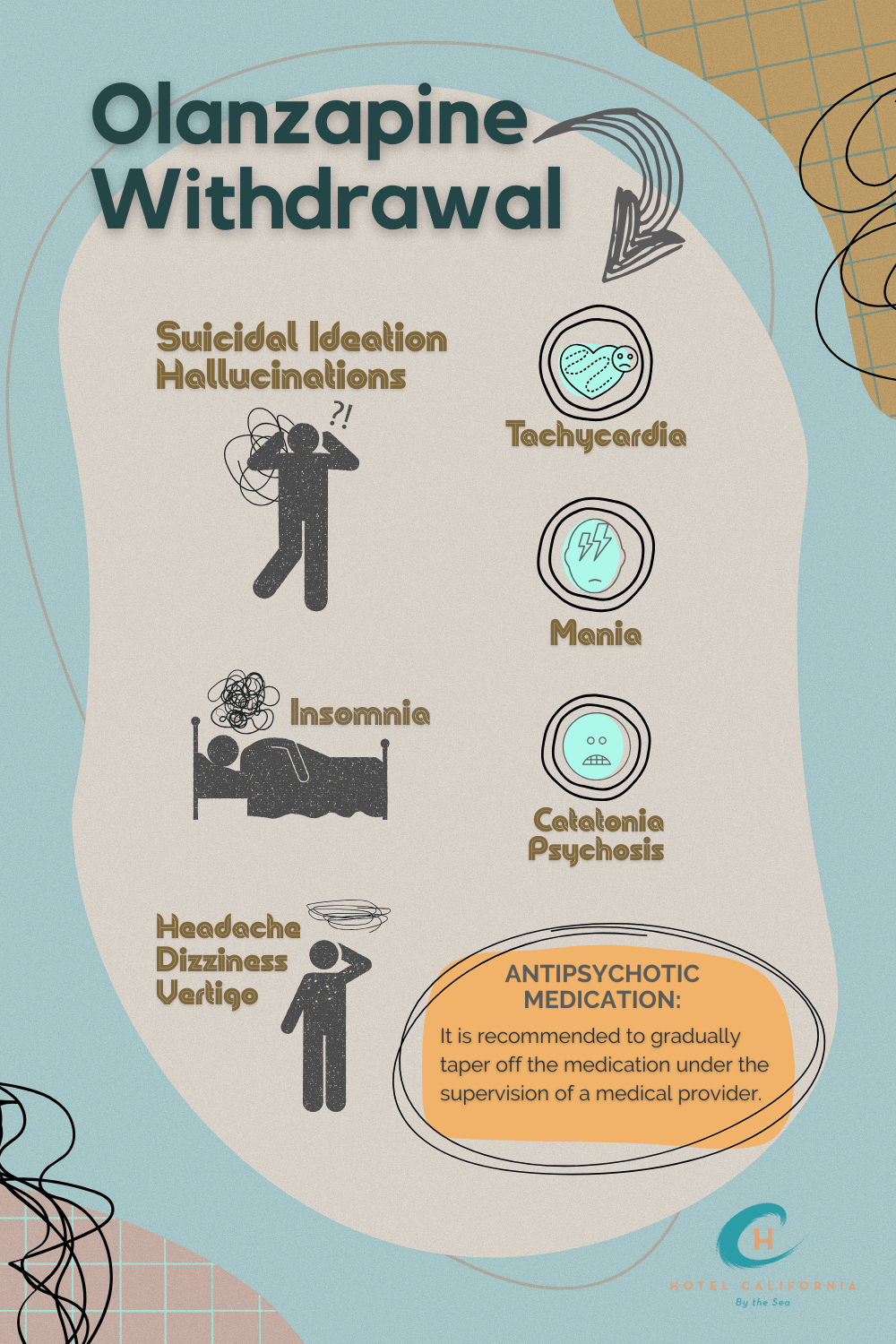Olanzapine Withdrawal
Antipsychotic withdrawal is a phenomenon characterized by symptoms of anxiety, insomnia, depression, tremors and headaches. Olanzapine, a second-generation atypical antipsychotic medication, can cause olanzapine withdrawal if the medication is abruptly stopped. In order to avoid uncomfortable withdrawal symptoms, it is best to gradually taper off the medication under the supervision of a medical provider.

Zeyprexa or olanzapine is FDA approved to treat symptoms of schizophrenia in patients 13 years and older. It can also be used to treat symptoms of bipolar disorder, which includes those who experience mixed and manic episodes.
Schizophrenia is a mental health condition that affects the way a person thinks, feels and behaves. Common signs of the condition include hallucinations in which a person begins to see, hear and feel things that aren’t really there.
They can experience delusions that are beliefs and ideas that are not true. They can experience disorganized thinking and have difficulty organizing their thoughts and making sense. Those with schizophrenia have very little desire to be around people, they have difficulty staying motivated and they can have difficulty speaking clearly.
Prescription medications like olanzapine help to rebalance neurochemicals in the brain for those with schizophrenia. Although not common, misuse of the drug can lead to drug dependence and olanzapine withdrawal.
Olanzapine: An Atypical Antipsychotic
Olanzapine works by rebalancing dopamine and serotonin chemical receptors in the brain to help improve thinking, mood and behavior. This helps lead to a decrease in hallucinations, delusional thinking, and disorganized thoughts, speech and behaviors.
The psychiatric medication is often prescribed for long-term treatment of bipolar disorder and acute treatment for agitation. Some people may experience episodes of deep depression during their bipolar disorder. If these depressive episodes do not improve after trying two other medications, olanzapine is often the last resort medication.
While it is generally used to treat symptoms of schizophrenia, it is also prescribed for off-label uses such as acute agitation, delirium, anorexia nervosa and chemotherapy-induced nausea and vomiting. Other off-label uses include treatment of OCD, PTSD, personality disorder and Tourette’s syndrome in children or teens.

Common Side Effects of Olanzapine
- Low blood pressure
- Drowsiness
- Restlessness
- Headache
- Fatigue
- Insomnia
- Weight gain due to increased appetite
- Increased glucose levels and high blood sugar
- High levels of fat in the blood
- Dry mouth
- Constipation
- Liver function test abnormalities such as jaundice in the skin and yellowing of the eyes
- Seizures
- Tremors
- Drooling or difficulty swallowing
Check Your Insurance Coverage for FREE
Find out if your insurance covers addiction treatment in minutes. We accept most insurance!
How long does it take until the Medication starts working?
It can take several weeks before you can feel the medication start to work and see changes in your symptoms. Symptoms such as hallucinations, disorganized thinking and delusions can start to see improvements within the first few weeks.
Feelings of motivation and desire also begin to improve around the first couple of weeks. Your symptoms of schizophrenia improve the longer you take the medication. Ultimately, it can take anywhere between 2-3 months before seeing the full benefits of the medication and symptom improvement.
Signs of Olanzapine Withdrawal
Antipsychotic withdrawal is a phenomenon called withdrawal dyskinesia. It usually occurs with the abrupt cessation of first-generation antipsychotic medications. With the second generation of antipsychotic medications, it is not as common, but it can still occur. It is not known to be an additive medication.
However, in some cases, it can cause drug dependence and withdrawal. This is because antipsychotic medications are usually long-term medications. Some people can go on taking the medication anywhere from 2-5 years. Abrupt discontinuation of a medication that your body has become very accustomed to can result in symptoms of withdrawal.
The half-life for olanzapine is about 2 days. It can take around 7 days in total for the medication to leave the system completely. Common withdrawal symptoms include:
- Return of mental health issues such as anxiety and depression
- Insomnia
- Suicidal ideation
- Loss of appetite
- Excessive sweating
- Dopamine super-sensitivity that can result in rebound psychosis that becomes more pronounced than pre-treatment psychosis
- Mania
- Hallucinations
- OCG – a condition where the eyes involuntarily deviate upwards
- Nausea and vomiting
- Catatonia
- Tachycardia – rapid heartbeat at rest
- Headache, dizziness or vertigo
Unfortunately, medical experts still know very little about withdrawal from antipsychotics like olanzapine. This is because they are most often prescribed in times of crisis and leave very little time to consider the long-term effects of the drug. They are also long-term use medications. Because of this, withdrawal can last anywhere from weeks to months. In extreme cases, it can last for years if the patient does not have adequate medical and psychological support.
Effective ways to treat Olanzapine Withdrawal
The timeline to withdrawal is dependent on each individual. In some cases, withdrawal can take up to several weeks to finally resolve. You should always take any prescription medication as per the recommendation of your healthcare provider. Medications like antipsychotics are effective when taken at the same time each day.
Do not stop taking your medication without consulting your provider. Do not forget or miss more than a few doses of your medication. Do not reduce your medication dose unless advised or without consulting your provider. In fact, never abruptly stop taking any sort of antipsychotic medication without consulting with a health care provider. These factors can increase the chances of developing withdrawal and relapse symptoms.
To reduce the intensity and possibility of withdrawal symptoms, it is best to medically taper off the medication. Gradually tapering off olanzapine over the course of several months in small doses can lead to significant changes in chemical receptor occupancy. This is because the dopamine and serotonin receptors are highly sensitive and even the slightest shifts and changes can impact withdrawal.
Reach out to Hotel California by the Sea
We specialize in treating addiction and other co-occurring disorders, such as PTSD. Our Admissions specialists are available to walk you through the best options for treating your addiction.
Treatment for Substance Use Disorder
Olanzapine helps improve the quality of life in patients with schizophrenia and other related psychotic disorders. It is not an addictive medication. But because of its long-term use, it can cause dependence, which can then lead to antipsychotic medication withdrawal. Withdrawal from antipsychotics can be painful and life-threatening if not treated properly. Behavioral health treatment programs like Hotel California by the Sea provide safe medical detox for such medications.
We offer treatment at all levels of care, including detox, residential, PHP and IOP. We utilize evidence-based methods such as CBT, DBT and EMDR therapy. Hotel California by the Sea is dedicated to helping clients overcome and reach their goals of sobriety and overcome their substance addiction.
References:
https://www.ncbi.nlm.nih.gov/books/NBK532903
https://www.alternativetomeds.com/blog/zyprexa
https://www.goodtherapy.org/drugs/zyprexa-olanzapine.html
https://www.nami.org/about-mental-illness/treatments/mental-health-medications/types-of-medication/olanzapine-zyprexa/
https://psychopharmacologyinstitute.com/section/antipsychotic-withdrawal-syndrome-symptoms-risks-and-prevention-strategies-2809-5726/
https://amfmtreatment.com/olanzapine-zyprexa/
https://www.mentalhealth.com/library/olanzapine-use-dosage-risks
